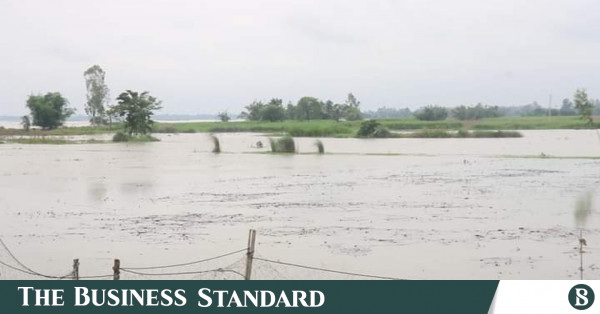2,000 families marooned in Lalmonirhat as water level in Teesta swelling


The low-lying areas and chars adjacent to the Teesta River in Lalmonirhat have been inundated. Photo: UNB
“>
The low-lying areas and chars adjacent to the Teesta River in Lalmonirhat have been inundated. Photo: UNB
Some 2, 000 families living in the low-lying areas and chars adjacent to the Teesta River in Lalmonirhat have been trapped as the water level of the river is rising again due to upstream flooding and heavy rainfall under the influence of the monsoon.
As of 3:00pm on Tuesday (2 July), the water at the Teesta’s Dalia point is flowing just 20 centimetres below the danger level.
However, at 12:00pm, it was flowing 30 centimetres below the danger level, an increase by 10 centimetres in just three hours.
If the water continues to rise, residents of the low-lying areas along the Teesta fear flooding. Several families in low-lying and char areas of five upazilas in the district have already become waterlogged due to the rising water levels.
The areas affected by the flood included Goddimari, Dowani, Saniyajan, Nij Shek Sundar, and Dhumni in Hatibandha upazila; Sindurna, Char Sindurna, Patikapara, and Dowabari in Singamari Union; Votmari, Shailmari, Nohali, and Char Bairati in Kaliganj upazila; Mahishkhocha in Aditmari upazila; and Khuniagach, Kalmati, Rajpur, and Gokunda in the Sadar upazila.
On Monday, the water had started to recede from these areas, but it began rising again on Tuesday afternoon, causing fresh concerns of flooding.
Ershad Mia from the Teesta Gobordhan area in Mahishkhocha union of Aditmari upazila, said that the water level is increasing, and it’s feared that by evening, water will enter homes in low-lying areas.
By nightfall, it is expected to flow near the danger level, potentially inundating these areas, he informed.
Sunil Roy, executive engineer of Lalmonirhat Water Development Board, told UNB that the water level of the Teesta started rising from Saturday afternoon. By Sunday at 6pm, it was flowing 15 centimeters below the danger level at the Dalia point. Although it receded on Monday, it began rising again on Tuesday afternoon.




